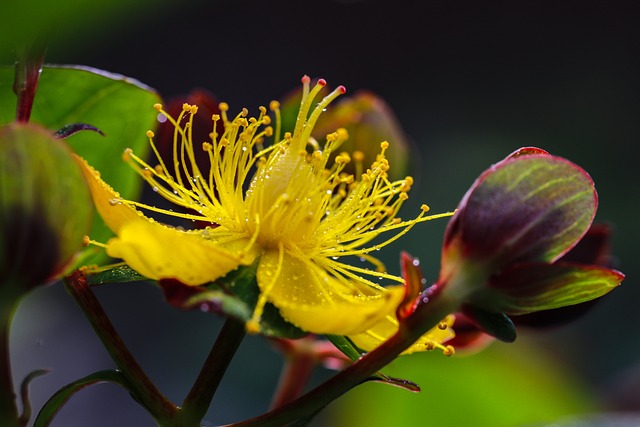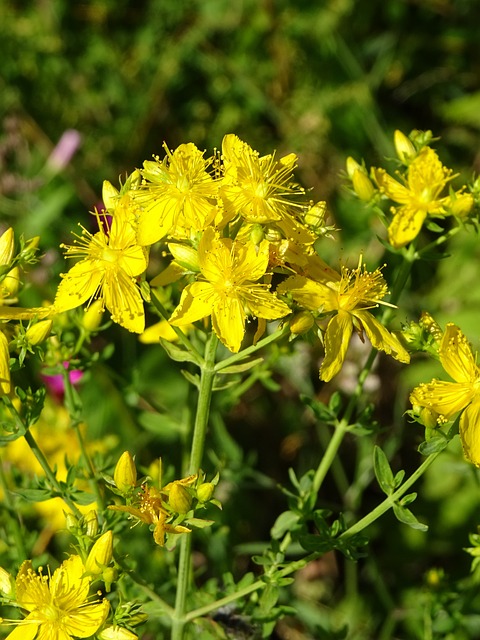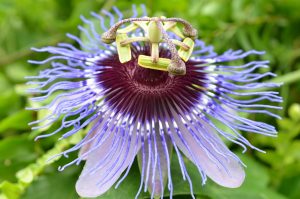Is St. John’s Wort Effective for Depression?

St. John’s wort is an herb that is commonly touted for the treatment of depression. And numerous clinical trials have been conducted exploring its effects. Based on the available evidence, it’s worth checking to see if St. John’s Wort is effective for depression. It’s also worth exploring potential side effects and drug-herb interactions.
St. John’s Wort (Hypericum perforatum)
As an herb, St. John’s wort is a common plant that often grows wild along the edges of roadways or other disturbed locations. I remember seeing lots of St. John’s wort when I was living in Seattle along the highways. The plant has yellow flowers and is often considered a noxious weed due to its ability to crowd out native plants and its toxicity to livestock. If eaten in large quantities by grazing animals, they can develop skin lesions from sun exposure that, in severe cases, can cause death. It can also lead to decreased weight, reduced wool or milk production while disrupting reproductive function (Bourke 1997). For humans, the standard treatment dose stays well below the toxic effects seen when animals consume the plant as food.
Mechanisms of Action
The benefits from St. John’s wort appear to stem from a number of different mechanisms. Initial reports suggested that St. John’s wort could increase neurotransmitter levels, like dopamine and serotonin, by inhibiting an enzyme that breaks them down: monoamine oxidase. However, active imaging studies in human subjects found that the effect was not strong enough to be clinically relevant (Sacher 2011).
Other data suggests that St. John’s wort works in a similar way to other antidepressant medications, by blocking the reuptake of neurotransmitters (Chatterjee 1998). This blocking mechanism increases the amount of neurotransmitters and their effects on brain cells. Unlike standard drugs which typically target serotonin, dopamine or norepinephrine, St. John’s wort also affects two additional neurotransmitters: gamma-aminobutyric acid (GABA) and glutamate. GABA is a relaxatory neurotransmitter that slows down brain activity, whereas glutamate has opposing activity that generally speeds things up.
Other effects have been noted, namely upregulation of serotonin receptors or changes in levels of messenger RNA used in serotonin receptor production (Zirak 2019). Serotonin receptors are proteins on the surface of cells that are activated by neurotransmitters. St. John’s wort also has notable anti-inflammatory effects (Raso 2002). Depression is associated with excess inflammation. By reducing this inflammation, you also improve depressive symptoms (Miller 2016).
Clinical Studies
Numerous clinical trials have explored the efficacy of St. John’s wort for treating depression. The first clinical trial in Germany compared it to placebo and found that two-thirds of patients responded as compared to just a quarter of patients in the placebo group (Schmidt 1993). Side effects were minor and transient.
One of the more recent clinical trials used St. John’s wort for the treatment of depression in postmenopausal women (Eatemadnia 2019). After two month’s treatment, 80% of women on St. John’s wort were free of depressive symptoms. They also had improvement in the intensity and severity of hot flashes. By way of comparison, only 5% of women who received placebo achieved remission of depression symptoms.
The most recent meta-analysis comparing St. John’s wort to standard antidepressants found that St. John’s wort was more effective with less side effects than medication (Zhao 2023). The analysis included 14 clinical trials with over 2000 patients.
Side Effects and Interactions
While generally safer than medication, St. John’s wort does carry some risks. Most products should not cause sensitivity to sunlight as seen in livestock (Schempp 2003). However, I know of patients who have developed sun sensitivity. if sunlight sensitivity occurs, discontinue the current product and consider an alternative product or a different treatment altogether.
St. John’s wort should not be combined with other medications that are used for treating mental health conditions. Serotonin syndrome, a life-threatening condition can occur (Borreli 2009). In addition, St. John’s wort can significantly decrease the efficacy of other drugs by increasing their metabolism or breakdown inside the body. Drugs known to have decreased efficacy while taking St. John’s wort include birth control and medications used to treat cancer, human immunodeficiency virus (HIV) and autoimmune conditions (Borreli 2009).
Hypericin and Hyperforin Content

Available products can be extracted to concentrate different constituents found in the plant. The main components of St. John’s wort that exert antidepressant effects are thought to be hypericin and hyperforin along with other flavonoids (Butterweck 2003). While many products focus just on hypericin content, the other constituents may also be important for full effects. Using a product with certified hypericin and hyperforin may be more effective than products certified for hypericin content alone.
Product consistency can also be a problem with some commercially produced St. John’s wort supplements (Wurglics 2001). Purchasing from a reputable company that has batch testing to certify the levels of active ingredients may help to improve the consistency of the antidepressant effects.
Conclusion
St. John’s wort appears to be an effective treatment for depression with an efficacy greater than standard medications and less side effects. However, herb-drug interactions are not trivial and product quality can be of concern. Working with a physician or healthcare professional knowledgeable in the use of St. John’s wort is likely the safest approach.




Nice post. I learn something totally new and challenging on websites